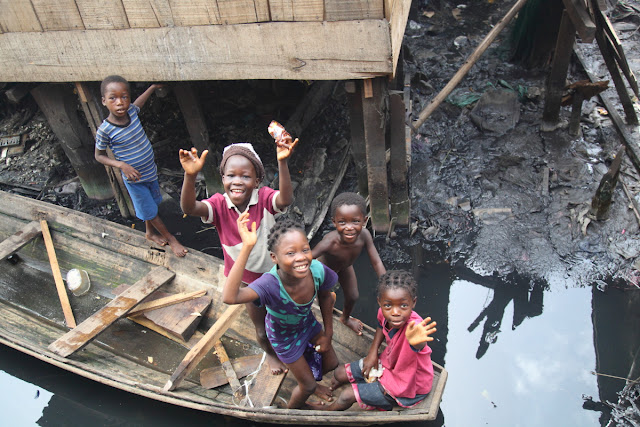 |
| welcome to Makoko |
Makoko is nested along the mainland of Yaba. It is build on the shallow waters of the lagoon. It is neighbouring another area where wood logs transported from forests in Oyo are being turned into construction wood. Some fire wood smoke permanently fills the sky and depending on the direction and strength of the wind is thickening the air with a strong smell as well.
Circulation is by wooden boat exclusively, motors are pretty much impractical on the narrow waterways that separate the houses built on stilts. Especially so, because these water channels are full of boats transporting people and mini-shops, here a lady selling hot food, another one fruits, a third clothes, grocery, etc... During peak hour, boats are bumping gently into each other and crossings can require a bit of coordination to let everyone go its own way.
 |
| doing business in traffic |
Kids are numerous, playing together on the tiny spaces above the water, on small wooden terraces, sometimes also feet in the dirty water of the lagoon that serves as a road but also as a recipient for all sorts of refuse. It can be very stinky if water level is low and as dark as chinese ink.
 |
| better on a boat |
The place is said to house over 100,000 people, coming from Badagry area. These are fishermen and most of them earn a living from fishing in the lagoon. Fishing nets can be seen all over the place The community is mixed between Christians and Muslims. Churches and mosques are also on stilt.
Medical facilities are fairly limited, so it is advisable to stay in good health. There is now a project to build a hospital on the land at the end of Makoko. There is a small maternity ward with 4 rooms and 8 beds. But as one put it, with a motorboat over the lagoon you faster anywhere in Lagos than with other road transport.
The Third Mainland Bridge has been built on the lagoon following the coast and is now the imposed line of horizon of Makoko inhabitants. And for car passengers on the bridge, Makoko is a very dense patch of wooden house built on water. An A-shaped building stands out, a floating school that takes care of primary education.
 |
| the floating school of Makoko |
There is no police in Makoko, the town is administered by the community under the direction of its chief, the Baale. He is responsible for resolving the more difficult issues. There is no death penalty in Makoko. The punishment for a serious crime, or theft is public humiliation. The culprit is brought out on the lagoon on a wooden boat at the beating of drums. Members of the community are shouting the name of the offense so that everyone is aware. That process is called Mahoho, from which the name of Makoko originates.




Comments
Post a Comment